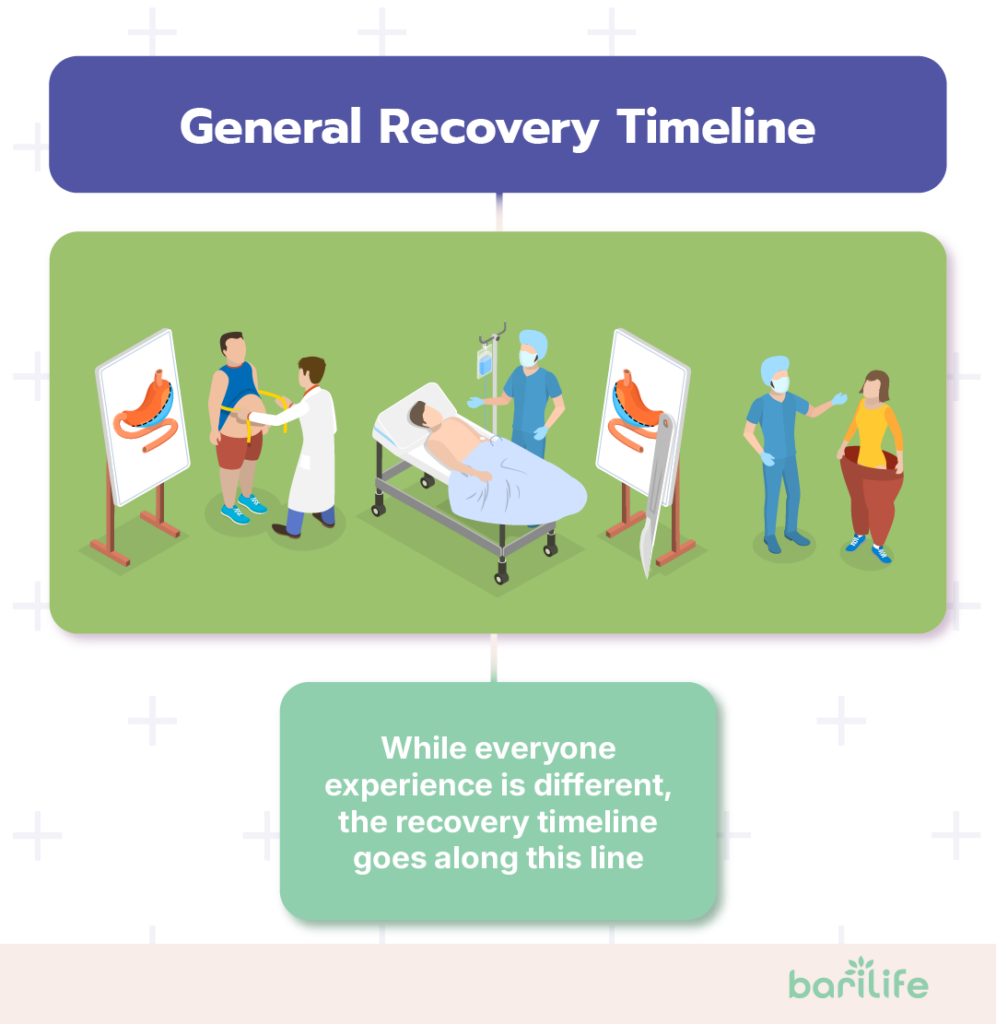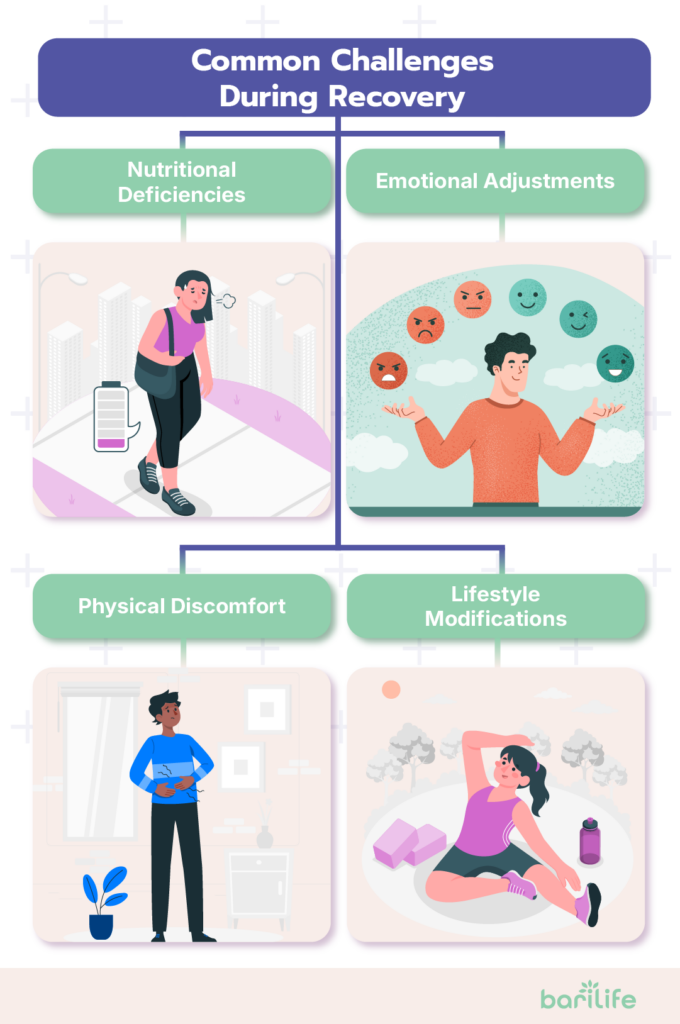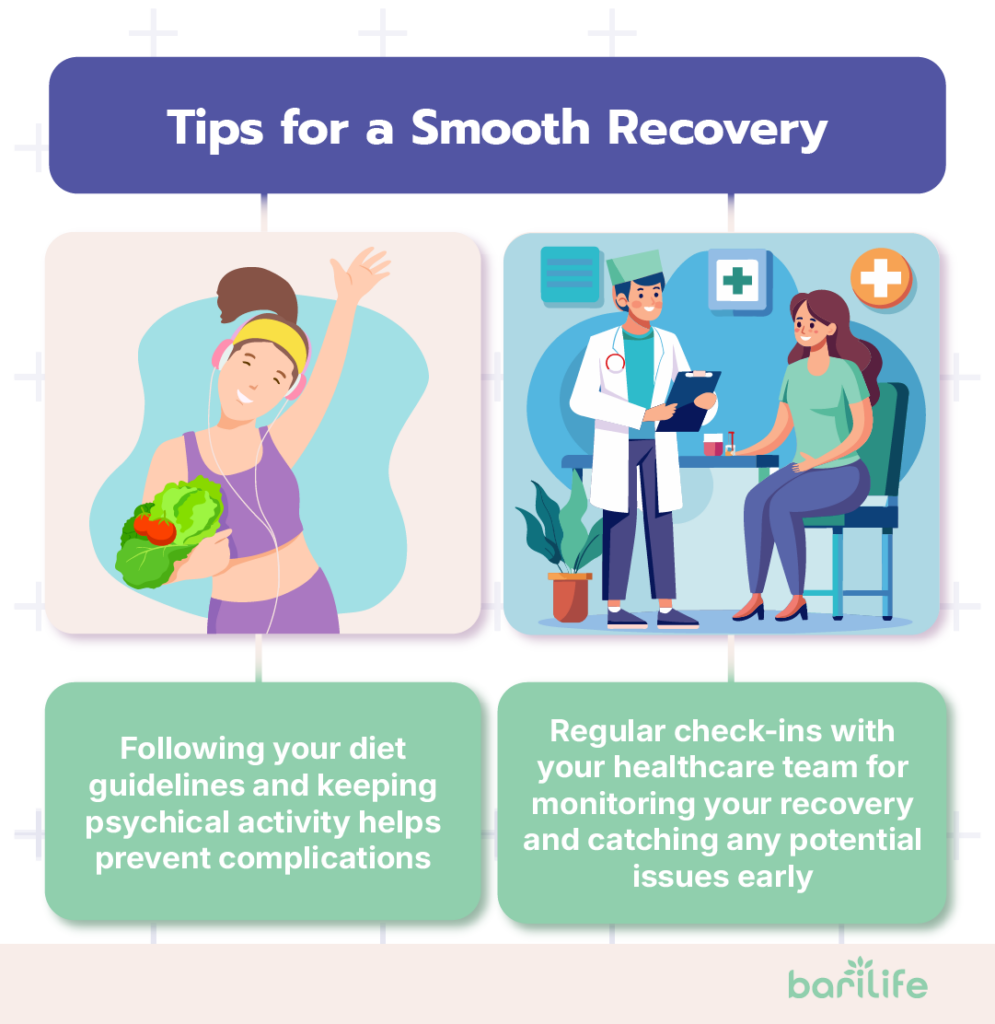Key Takeaways:
- Recovery time varies based on the type of procedure, with laparoscopic surgeries generally having shorter recovery periods than open surgeries.
- Most patients can return to desk jobs within 2-3 weeks, while physically demanding jobs may require 4-6 weeks of recovery time.
- While visible healing occurs within weeks, complete physical and emotional adjustment to your new digestive system can take up to a year.
As someone about to undergo bariatric surgery or has just undergone it, you might wonder about the recovery time. Questions like "How long does it take to recover from bariatric surgery?" and "What will recovery actually feel like?" might come up in your mind.
These are great questions, and the answers can vary from person to person. It's not the same for everyone. Some people bounce back quickly, while others need more time. In this article, we'll talk about what you can typically expect during the healing process and how to make your post bariatric surgery recovery as smooth as possible.
Factors Affecting Bariatric Surgery Recovery Time

Before we get to the timeline, you should know that several factors can influence your recovery time.
Type of Surgery
The specific procedure you have makes a big difference in your recovery journey. For example, recovery time from laparoscopic bariatric surgery is generally shorter than recovery from "open" surgery.
If you've had gastric sleeve surgery, where part of your stomach is removed, your recovery might look different than if you had gastric bypass, where your digestive system is rerouted. Bariatric sleeve surgery recovery time tends to be shorter than recovery from more complex procedures like bypass surgery.
Overall Health
If you have other health conditions like diabetes, heart disease, or sleep apnea, your bariatric surgery healing time might be longer. These conditions can affect how quickly your body heals.
Lifestyle Choices
Some personal habits can greatly impact your recovery time. For instance, smoking slows healing by reducing blood flow to your tissues. If you smoke, your doctor has probably already talked to you about quitting before surgery.
Consuming alcohol can also affect your healing and cause problems with the medications you'll take after surgery.
General Recovery Timeline
While everyone's experience is unique, here's a general bariatric surgery recovery timeline to give you an idea of what to expect:
Hospital Stay
After your procedure, you'll typically spend two to three days in the hospital. During this time, your medical team will keep a close eye on you, making sure you're recovering well. They'll check your vital signs, manage your pain, and help you start moving around.
Yes, you read that right—you'll be encouraged to get up and walk around as soon as possible after surgery! This helps prevent blood clots and gets your recovery off to a good start.
First 2 Weeks

Once you're home, the real recovery begins. During the first two weeks after surgery, you'll need to focus on rest and healing. This doesn't mean staying in bed all day—walking around your home is encouraged.
Your diet during this time will be very limited. You will usually start with clear liquids and then progress to full liquids like protein shakes. This will give your newly modified digestive system time to heal.
You might feel tired, sore, or uncomfortable during this time. That's completely normal when recovering from bariatric surgery. Your body is working hard to heal, and the fatigue you feel is part of that process.
Weeks 3-6
This is when many patients start feeling more like themselves again. During this period of bariatric recovery, you'll gradually increase your physical activity, though you'll still need to avoid heavy lifting or strenuous exercise.
Your diet will also progress during this time, moving from liquids to pureed foods and then to soft foods. This gives your stomach time to adjust to different textures and helps prevent complications.
Many people can return to work during this period, especially if they have desk jobs. For those with physically demanding jobs, it might be four to six weeks before you're cleared to return.
After 6 Weeks
By the six-week mark, most patients have turned a corner in their recovery. Many people can resume most normal activities at this point. Your surgeon will provide you with specific guidelines based on your progress.
This doesn't mean your body is completely healed—internal healing takes longer than what you can see from the outside. But by this point, you'll likely be feeling much better and getting used to your new lifestyle.
It's worth noting that full emotional and physical adjustment can take up to a year or more.
Common Challenges During Recovery

Here are some common hurdles people experience when recovering from bariatric sleeve surgery or other bariatric procedures:
Nutritional Deficiencies
After surgery, your body won't absorb nutrients like it used to. This means you might be at risk for vitamin and mineral deficiencies if you don't follow your supplement regimen carefully.
Your medical team will recommend specific supplements and perform blood tests regularly to monitor your levels.
Emotional Adjustments
What happens after bariatric surgery isn't just physical – there's a significant emotional component, too. Many patients experience mood swings, feelings of regret, or even depression during recovery. These feelings are normal and usually temporary.
Your relationship with food and body image is changing dramatically. These are big adjustments that take time. Be patient with yourself, and don't hesitate to reach out for support if you're struggling emotionally.
Physical Discomfort
Pain, fatigue, and digestive issues like nausea, gas, or constipation are common during recovery. Most of these symptoms improve over time as the body heals and adjusts. Your surgical team will provide medications to help manage these symptoms.
Lifestyle Modifications
Adapting to new eating habits and activity levels can be challenging. You'll need to eat much smaller portions, chew thoroughly, eat slowly, and avoid certain foods. You'll also need to add regular physical activity to your routine.
These changes are a lifelong commitment essential for maintaining weight loss after surgery. The good news is that these new habits typically get easier over time.
Tips for a Smooth Recovery
Want to make your bariatric surgery healing time as smooth as possible? Here are some helpful tips:
Follow Dietary Guidelines
Your medical team will provide you with specific recommendations about what to eat and when. Follow these guidelines, as they're designed to help your body heal while preventing complications.
Straying from the recommended diet can cause pain, vomiting, or even damage to your surgical site. It's simply not worth the risk.

Stay Active
While you shouldn't overdo it, regular gentle movement is important for recovery from bariatric sleeve surgery or any bariatric procedure. Walking is usually the recommended activity in the early days after surgery.
As you heal, you'll gradually increase your activity level. Regular exercise helps prevent complications, speeds up healing, and supports your weight loss goals.
Attend Follow-Up Appointments
Regular check-ins with your healthcare team are important for monitoring your recovery and catching any potential issues early. Don't skip these appointments, even if you're feeling great!
Your bariatric program will likely schedule several follow-up visits in the first year after surgery and annual appointments after that. These appointments are a great time to ask questions, get support, and ensure you're on track with your recovery and weight loss.
Seek Support
Connecting with others who understand what you're going through can make a big difference in your healing journey. Consider joining a support group specifically for bariatric patients. Many hospitals and bariatric centers offer these groups, and there are online communities as well.
When to Seek Medical Help
Call your surgeon immediately if you experience:
- Signs of infection: Fever over 101°F, increasing redness, warmth, swelling around your incisions, or any discharge from your incision sites could indicate an infection.
- Severe pain: Some discomfort is normal after surgery, but severe, worsening, or new pain should be reported to your doctor right away.
- Persistent nausea or vomiting: While some nausea is common early in recovery, constant vomiting can result in dehydration and electrolyte imbalances. It might also indicate a problem with your surgical site that needs to be addressed.
- Shortness of breath: Difficulty breathing or pain in your chest could mean there's a blood clot in your lungs (pulmonary embolism), which is a medical emergency.
Conclusion

The most important thing to remember is that everyone's recovery is unique. What's "normal" differs from person to person. By following your medical team's guidance, being patient with yourself, and reaching out for support when needed, you'll be able to recover successfully and be on your way to improved health and wellness.
How Bari Life Can Help
Proper nutrition is crucial during your bariatric surgery recovery. Bari Life's specially formulated bariatric vitamins and protein supplements help prevent the nutritional deficiencies that commonly occur after surgery and can slow down your healing process.
Our comprehensive line of products includes bariatric multivitamins, available in convenient bariatric vitamins chewable form, as well as a bariatric multivitamin with iron to support your body's increased nutritional demands. We also offer liquid bariatric vitamin options for those who prefer an easy-to-digest supplement right after surgery.
In addition to vitamins, Bari Life provides high-quality bariatric protein bars and bariatric snacks to help meet your protein needs while satisfying cravings in a healthy way. Our bariatric calcium chews are a delicious and effective way to maintain strong bones during your recovery.
For gut health and improved nutrient absorption, consider adding a bariatric probiotic to your daily routine. And for those experiencing post-surgery thinning hair, Bari Life offers targeted bariatric vitamins for hair loss to support healthier hair regrowth.
Visit Bari Life today to discover how our complete bariatric vitamin formulas can support your recovery and help you transition successfully to your new post-surgery lifestyle.
If you want to learn more, why not check out these articles below:
- Why Are You Not Allowed To Use a Straw After Bariatric Surgery?
- How Long After Bariatric Surgery Can I Drive?
- How Long After Bariatric Surgery Can You Have Sex?
- How Long After Bariatric Surgery Can You Swim?
- How Long After Bariatric Surgery Can I Go Back To Work?
- Vaping After Bariatric Surgery

Leave a Comment
Your email address will not be published.